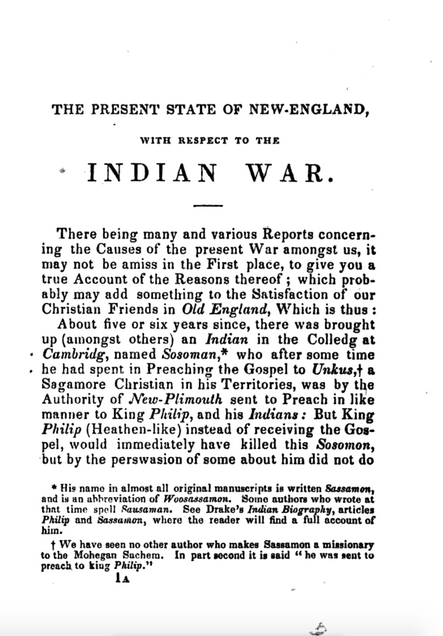The present state of New-England with respect to the Indian war (London, 1676)

Juan Fernandez and Greta Bauer
The Indian War (also known as King Philip’s War) was catastrophic for the newly-minted Massachusetts Bay Colony. Tens of towns were the new target of attack and colonists, barely used to their new lifestyle, were forced to adapt to an increasingly hostile environment. Beyond physical damage, both the Puritans and Natives wrestled with how to treat their new neighbors. The Englishmen, most of whom were supposedly known for peace, unleashed furious revenge against the “savage monsters” attacking. Meanwhile, the Natives were only defending their land and culture from being ripped away. Both groups faced intense identity crises in the aftermath of the war as they had to relearn how to live comfortably with each other, even after the atrocities committed. The socio-economic aspect of the Colony was changed forever, and The Present State of New England with Respect to the Indian War gives the modern-day reader a first-hand perspective on what life was like for an Englishman immediately following the war.
For our artifact, we were given a piece of literature written by a Boston man in the 17th century who is only acknowledged as N.S. The unknown merchant penned letters about his experiences after the war, dating from late June 1675 to late November of the same year, and these letters were sent to a friend of his in London. In 1833, these letters were compiled together by a descendent of the receiver who also added his own take on the documents. The 19th century examination and insight into the text presents more insight to what is detailed by the author in the origin document. The anonymous merchant who had written The Present State of New England with Respect to the Indian War describes the war and immediate effect after with graphic detail. The document was written with intentions to inform a friend of the author in London of what was happening in New England. The fear of the author is evident in which he describes the sense of uncertainty that was followed throughout the time of the war. Puritan lifestyle changed as their relationships with the Natives shifted – fear and uncertainty reeked from both peoples.
While many modern day scholars are careful to point out that King Philip’s War became a double-edged sword with no real winner, they are quick to place blame on either or both sides. Some say that the aggressors had the hardest job morally in disposing of their captives. Linford D. Fisher states that “each colony had differing policies for surrendering natives, but generally the thousands of surrenderers received far worse treatment than they expected.” Christine DeLucia compares King Philip’s War to the Holocaust and American Civil War, saying that all are common in “the conflict has lingered in collective remembrance because it forces confrontations with fundamental pieces of identity.” This seems like a shocking accusation to compare such modern atrocities to the Indian War, but for the settlers and Natives, the constant fear and paranoia made living peacefully together near impossible.
The choices that the author makes throughout the letters he writes exhibit a narrative that contributes to the issues in Indian/settler relations. The author can be understood as an embodiment of the society itself as the entries throughout the document demonstrate the distrust Englishmen had towards the Natives and their resistance to change. As he writes to his friend, the author details many of the battles amongst the settlers and the Natives that occurred throughout the war, which only strengthens the common prejudice attitudes that plague New England and the future of the United States.
While the author salutes the behavior of war captains like that of Captain Samuel Mosely, he condemns any similar behaviors from the Natives. For example, when introducing Mosely on page nine of the text he is described as “an excellent Souldier, and an undaunted Spirit, one whose Memory will be Honourable.” Furthermore, when discussing the settlers’ relations amongst the Natives, evidence proves that Natives were only respected if they were thought to have any moral or physical resemblance to the settlers. Frequently used terms like “Friend Indian” throughout the text are used when describing the Natives who were converted into Christianity, and the choice behind using this language details a sense of selective respect. In his own account of the events that occurred throughout the war, there is a noticeable lack of the Englishmen being held accountable for their part in the damages. These 17th century views show firsthand how the Natives were set up for a tumultuous and unfair lifestyle.